
Top stories






More news














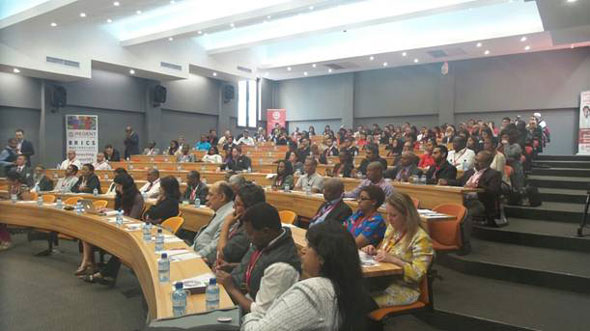
The Master of Ceremonies for the first session, Professor Marvin Kambuwa, having welcomed and introduced the members of the BRICS Masterclass discussion panel, requested Professor Sooklal to officially launch the BRICS and Emerging Markets Business Schools Association (BSA). Professor Sooklal congratulated Regent Business School for having initiated talks with him regarding the feasibility of such an association about two years ago. In particular, he praised Regent Business School for offering a new lodestar for business and management education to the world. He informed the house about the route that had to be followed for the BSA project proposal to succeed. Initially, the proposal had to be sanctioned by the Human Sciences Council of South Africa and then had to serve on the agenda of the Academic Forum Meeting of the summit which was held in Ufa, Russia last year. The launch of the BSA, he asserted, in a sense, was fortuitous especially given the recent global financial crisis and the role played by euro-centric business education in the calamity. He urged all the representatives of the BRICS countries to encourage their higher business education institutions to subscribe to the mission of the new endeavour launched by Regent Business School and create a new global network for business education. He felt it was long overdue, to boot.
The main panel for the Masterclass discussion panel was composed of the ambassadorial representatives of the BRICS countries and Mr Ahmed Shaikh and Professor Dhiru Soni from Regent Business School. South Africa was represented by Professor Anil Sooklal who is the country’s BRICS’s ambassador.
Prior to the commencement of the Masterclass, delegates were treated to a breakfast at the new Regent Business School Restaurant, which is also housed in the Institute of Entrepreneurship.
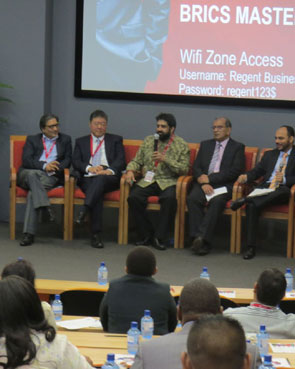
Professor Sooklal was lead speaker at the Masterclass and provided a brief history of the BRICS formation and then enlightened the audience about the phenomenal growth of trade between the BRICS countries.
The leap in importance of the BRICS, he said, has been most pronounced for South Africa. A decade ago trade with the BRIC economies accounted for just 5% of South Africa’s total trade with the world. In 2014, this figure stood at 19%. Last year, South Africa’s exports to its fellow BRICS economies increased by almost 17%. Intra-BRICS convergence is being led by China. China acts as a counter party in 85% of intra-BRICS trade flows.
Significantly, he noted, the BRICS trade more with Africa than they do amongst themselves. The BRICS total trade with Africa reached USD340bn in 2014, representing a more than ten-fold increase over the course of a decade. Since 2007 BRICS trade in Africa has more than doubled. South Africa is responsible for 11% of BRICS-Africa trade. The opportunity for trading with the BRICS countries was immense, claimed Professor Sooklal and urged captains of industry, managers and leaders of business firms and representatives of small- and medium-sized enterprises to seize the opportunity and explore trade with business organisations from other BRICS countries.
Mr Osman Seedat, who was the Facilitator for the Masterclass, then fielded questions to all the BRICS representatives. The responses to these questions were very informative and delegates were pleasantly surprised to hear how far the BRICS nations had progressed in terms of bilateral agreements, and especially trade. The Consul General of the People’s Republic of China in Durban, Mr Ning Jun, was questioned about China’s economic success story. In his response, he said that amongst the many factors, the issue of the ‘will of people’ stood out as of the primary factor. He was also quick to point out that education and skills development played a key role in the country’s success story.
The delegates to the Masterclass were also provided with an opportunity to field questions. After a robust question and answer session, the Master of Ceremonies, Mr James Sturdee brought the session to a closure. The panel was presented with bronze cast of a rhino by Mr Ridwaan Asvat who also presented the Vote of Thanks.
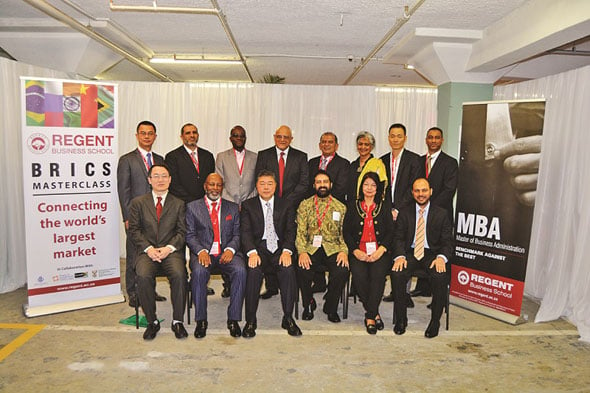
Immediately after the Masterclass and a Finger Lunch, delegates were treated to an exhibition by South Africa’s world-famous artist and activist, Mr Andries Botha.
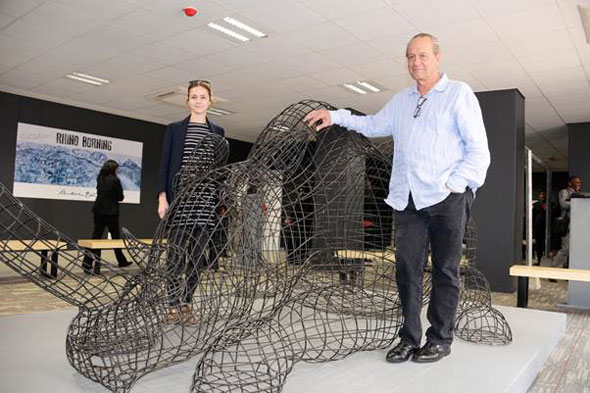
This exhibition by Andries Botha and Jessica Bothma is a song for the rhino and the tree. The rhino in this exhibition is part of the Rhino Burning made by Andries Botha and Ernest Ngcobo. The elephant is called Loxodonta Africana (Andries Botha, 2011). The rhino drawings are stations of the Rhino Burning. Jessica Bothma included two trees in this exhibition and is part of the Rhino Burning campaign. One tree is a large restrained paper tree (ziziphus murcronata, 2013), and the other, a small transformed mechanical tree (Widow Tree, 2016). Bothma is a sculptor and assistant to Andries Botha. He said, “The story of this exhibition is intended to touch one’s heart and then the mind; words on their own would simply distract the song-line of one’s soul.” He made an impassioned plea to all who visit the exhibition over the next two weeks to keep an open mind and not be distracted by the noise and pollution that is out there. He urged visitors to “open your soul to the sounds of nature and the infinite wisdom it has to offer – even for business education."
Below is a pencil sketch by Andries Botha which was turned into a billboard-size artwork, ahead of a series on Critical Conversations in Sustainability, which Regent Business School hopes to present in the near future.
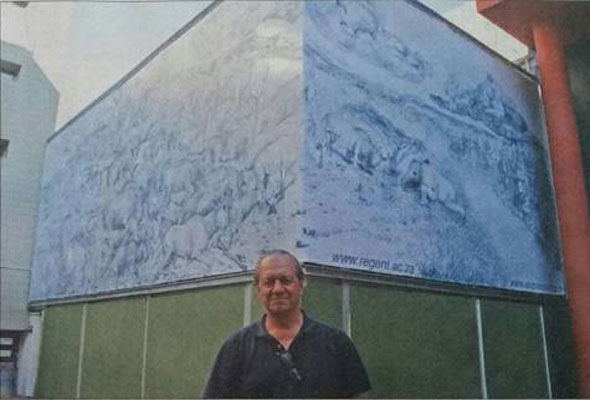
Critical Conversations in Sustainability: Back to the Future
Regent Business School is planning to host a series of ‘critical conversations’ relating to one of the most widely embraced solutions to the gravest concerns of our era - sustainability.
Pursuant to deliberations pertaining to questions of sustainability in our brown-bag seminars on Critical Management Issues, robust discussions relating to the core curriculum of the new MBA degree and the debates that emerged from the Exhibition on Sustainability by world-famous artist Andries Botha and his colleagues Jessica Bothma and Ernest Ngcobo at the recent BRICS Masterclass event, Regent Business School will host a Series of Critical Conversations in Sustainability – an issue which was once convenient and fashionable to discuss in terms of social responsibility and now the new cornerstone to value creation, especially in the interest of a global sustainable future.
The ‘Conversations’ series will creatively explore the unexplored, and re-engage in critical discussions, provocative dialogue and idea-sharing around critical sustainable questions of our day. These ‘conversations’ aim to push past the conventional ideas of sustainability by delving into novel and innovative ideas for mobilising for changes necessary for our planet to become a better place for it fauna and flora. In this respect, the ‘Conversations’ will attempt to bring together academics, environmentalists, researchers, policymakers, practitioners, community leaders, captains of industry and government officials to illustrate the importance of dialogue in solving the key problems of sustainability.
Mr Ahmed Shaikh, the Managing Director of Regent Business School, was elected to the position of Deputy President of the South African Business Schools Association (SABSA) at its recent meeting. We are confident that he will bring his cogent leadership qualities to bear on SABSA and wish him all of the best in his future endeavours. Congratulations!